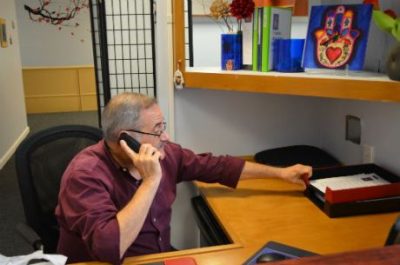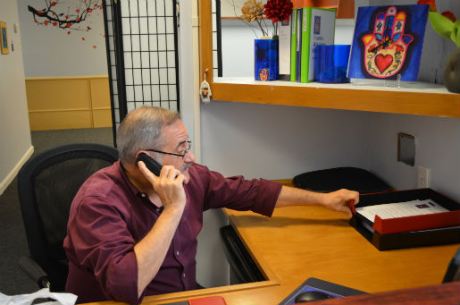
WASHINGTON – When Rabbi Jeffrey Kahn told his former congregants that he was opening a medicinal marijuana dispensary, they were nothing but supportive.
“The cannabis plant was created by God on the second day of creation when God created all the other plants, and touching this one isn’t forbidden,” Jeff said in a June interview.
As somebody who “came of age as a rabbi during the age of AIDS,” Jeff’s no stranger to the pain felt by those without the access to the medicine they need.
And as “a lifelong educator,” Jeff said the Jewish aspect of the work he does now is strong. He still teaches people to question preconceived falsehoods, whether it’s in Hebrew School or about medicinal marijuana. The fact that that education can then lead to people getting the medicine they need makes it all the more Jewish.
“The whole idea of breaking through those kinds of barriers and being able to help to connect people to what can really help them, it just seems a natural extension of my rabbinate and a natural extension of what’s important to me about how Judaism views life and the world,” Jeff said.
When you’re sick, Jeff said, it’s OK to eat on Yom Kippur. The inverse is true: As Jews, we have a responsibility to help those that are sick even when we should be praying.
“The mitzvah of helping people is more important,” Jeff said.
So Jeff ended his 30-year career as a congregational rabbi and dedicated three years of his life, attending countless local government meetings; speaking with local business owners, neighbors and even D.C. Councilmember Muriel Bowser; and renting a space for two and a half years — all before he even knew if the center would open.
That day finally came Aug. 1, and the Takoma Wellness Center has served three customers.

“We’ve been in the helping professions for our entire lives,” Stephanie said.Jeff worked full time to get the clinic up and running while his wife, Stephanie Reifkind Kahn, continues to work as Specialty Hospital of Washington Hadley’s director of performance improvement and regulatory compliance.
In a town known for a bureaucracy that citizens love to hate, the Kahns optimistically filled out their 350-page application in November 2011 and followed the constantly-revised rules that will eventually regulate the 1999 decision by D.C. residents to legalize medicinal marijuana.
“The Department of Health, although they’ve been very slow, have been very positive,” Stephanie said. “They just really want to get it right. There’s been so many problems in other places. Everyone is very aware that this is our nation’s capital, and they don’t want to have problems.”
And neither do the Kahns. The Takoma Wellness Center is set in a safe, northwestern outskirt within the District’s borders, right by the Metro that takes passengers right into the heart of D.C. The door to the shop, framed in a tan, brick arch and a gravel driveway, has not one, but two doors between unseemly types and the clinic’s lobby. The Kahns want no business with drug use’s “counter-culture,” and security will be tight with the help of a guard checking IDs and security cameras trained on the entrance.
Those who visit the clinic will be benefitting charity as well, since all of the center’s profits will go to non-profits in the local area.

Once inside, the pale blue-gray walls feel like your neighborhood doctor’s office. The office walls are lined with hamsas, the Jewish symbol to ward away evil. Most of them belong to the Kahns and are from Israel.
“I really love them because the idea of healing and protection, and also because of harmony,” Stephanie said.
Past the lobby, a private consulting area for patients examining various types of marijuana both with and without THC, including Jack Herer, OG Kush, Master Kush and Blue Dream (all four of which are grown in D.C. by cultivators licensed by the D.C. Department of Health). They can weigh the benefits and disadvantages of different consumption methods: smoking, vaporizers; cooking it into butter or oil; tinctures; pills. There’s also a library with about two dozen books and a stand with more literature on medicinal marijuana.
“We really wanted it to not look like anything having to do with counter culture, that it looks warm and professional and a place that anybody could come in and feel comfortable,” Stephanie said.
There’s still stigma attached to dealing marijuana, even when it’s legal. But the Kahns said they’ve heard only support from their loved ones.
“A few years earlier, maybe not even 10, it would have been different,” Jeff said. “I think we would have gotten less support.”
Jeff and Stephanie have encountered those stigma. Stephanie’s mother and father suffered from diseases that would have benefitted from the drug. Her father, Jules Reifkind, had multiple sclerosis, her mother, Libby, had lung cancer. Their doctors both prescribed medicinal marijuana, and her father benefitted greatly from its healing properties.
When his doctor first told him to take marijuana, “my father was very, you know, middle class business man, and this was the ‘70s, and he was like, ‘Are you high?’” Stephanie said.
“Finally he did, and it made a huge difference,” Stephanie said. Jules died in 2005 at the age of 75.
But Libby never received that treatment, since she died two months after being diagnosed in 2009.
There will come day, Jeff said, when dispensaries won’t be necessary, when marijuana will be treated like any other prescription drug, when people like Stephanie’s parents won’t have to suffer when the drug they need is illegal.
“In the meantime,” Jeff said, “this a great way to be able to make sure people can get their medicine safely — safe medicine — without having to go to dangerous places to get it.”
Zach C. Cohen is a student at American University currently studying abroad in Costa Rica.
[fbshare type=”button”]

